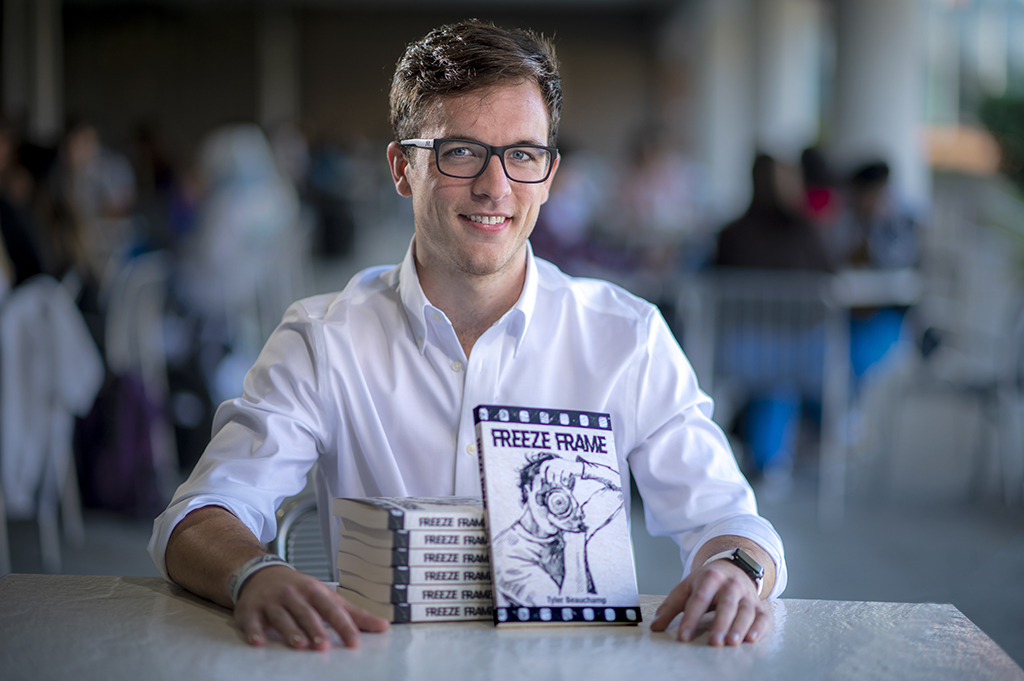Augusta University student Tyler Beauchamp was a junior in high school when he completed his first book outline. While he admits the outline is laughable now, he does remember what he told his parents when he was finished:
“It’s not going to be tomorrow, or next week, or next year, but one day I’m going to be an author. I can’t explain it, but I feel it’s something I just have to do.”
Fast forward eight years later, and the fourth-year Medical College of Georgia student is celebrating the publication of his first book, Freeze Frame, which explores the mind of a troubled teen filmmaker who is plagued with the horrors of his tragic past.
“In middle school, I started studying film on my own and began exploring screenwriting. It was then I realized I loved crafting stories way more than filming, and pretty much put down the camera in favor of writing.”
Beauchamp has been working on Freeze Frame since the beginning of the COVID-19 pandemic. At the time, he was in his second year of medical school — just before the start of clinical rotations — and working from home. When he finished his studies for the day, he would unwind and write. More than a year later, he had his first manuscript draft.
A friend and classmate who had a book of her own published gave him the contact information of the company she used. After six months of editing, the final draft was complete.
“In college, I mainly focused on pre-med studies, but I explored creative writing on the side through clubs and electives. I knew no matter where I went, I needed to keep writing,” he said.
“That’s when I wrote my first-ever published short story — that made me feel like a million bucks. I also started keeping a notebook with me at all times to jot down random story ideas, characters, or little factoids that would come to mind. You just never know when a good idea will come.”
Read more: MCG student writes children’s book on how to deal with the pandemic
Growing up, Beauchamp wanted to be a director. His father had worked in film and television and his household was always bustling with film and news talk and movie nights. He started making home movies when he was about 10, and every chance he got, he’d walk around with a camera filming and making life more dramatic.
“God bless my family and friends for being patient with me,” Beauchamp quipped. “A few of the movies still exist, as bad as they are, but I remember getting so invested in storyboarding and planning shots, my life practically revolved around it. In middle school, I started studying film on my own and began exploring screenwriting. It was then I realized I loved crafting stories way more than filming, and pretty much put down the camera in favor of writing.”
Freeze Frame follows high school junior Will Horner, an introverted filmmaker attending Pinehurst Academy, an arts school. When his emotions take over, Horner’s reality begins to shift and at any moment, when he becomes too nervous, excited or scared, his world transforms into a new reality: a real-life film.
Beauchamp said the inspiration for the story started at the beginning of quarantine. He was living in a room with no windows and at times, he didn’t know whether it was “light or dark, rainy or sunny.”
“The mind can wander in a place like that, and I remember having these vivid daydreams. After one of them, it took me a minute to figure out if the daydream had actually happened. That’s when this image appeared of a boy who was constantly jumping in and out of reality,” he said.
“I had spent a lot of time working at a free mental health clinic in medical school, and that paired with my own mental health battles helped shape the boy’s story.”
At that moment, he wanted to tell a story about a vulnerable boy overcoming trauma while highlighting key issues of youth mental illness today, whether it comes from social media, peer pressure or anxiety and depression. In his opinion, children are the most vulnerable members of society, which “runs at a sprint driven by social media.”
“Children are surrounded by social pressures very few of us can even fathom, and I really don’t mean to say social media is bad,” Beauchamp said. “In fact, when used properly, I think it has the power to be our saving grace. But anything powerful can be destructive. Sometimes we don’t think about just how much power a child with a phone wields, and neither do they. We don’t just need to teach children how to use these tools responsibly, but there needs to be better guidance behind the tools themselves to protect kids.”
With that, his antagonist was born to combat these counterculture kids. He said Horner’s journey definitely “gets meta at times,” but being able to write a story from that perspective allowed Beauchamp to highlight how everyone lives out their own trauma in a unique way.
Some might remember Beauchamp from a music video he and classmates Andy Nguyen and Rushay Amarath-Madav produced in 2021 at the height of the pandemic. Beauchamp said having a creative outlet acts as a release to everything he encounters daily.
“I don’t think I could do medicine without letting my creative side out every now and then. It just makes me feel human,” he said. “That music video was such an incredible experience, being able to be creative and simultaneously make an impact during a difficult time. Afterward, I was aching for another creative outlet: enter Freeze Frame. There is something about creativity I really find beautiful. Everyone has the ability to make something that’s never been made before, and when they do, they allow others to experience something new. That’s exciting.
“I look at some of my favorite physicians and all of them have cultivated some sort of passion outside of medicine,” Beauchamp added. “I think it’s what makes them such warm and caring providers. At the end of the day, our job is to improve the lives of others so they can be their fullest selves and live happier lives. When we practice what we preach and take care of our minds and hearts, I believe that bleeds over to our patients and how we care for them.”
For more information on Beauchamp and the book, visit his website or purchase a copy on Amazon.
 Augusta University
Augusta University




